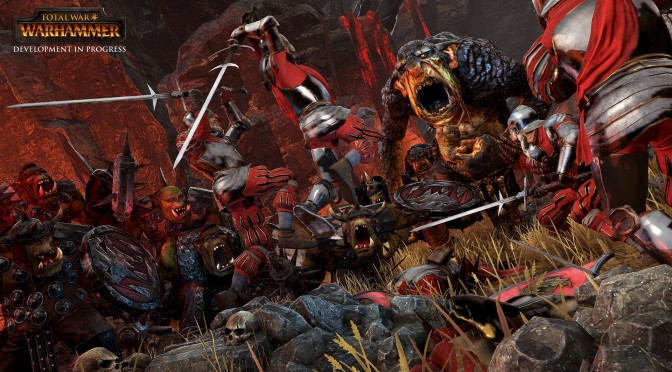The Creative Assembly has just released a ‘in-engine cinematic’ trailer for Total War: WARHAMMER. In order to avoid any backlash from the community, the team decided to shed some light on what it considers a ‘in-engine cinematic’ trailer and explain the differences between it and a ‘gameplay’ trailer.
As The Creative Assembly explained:
“The cinematics team often ask our team of animators to make some custom animations for these trailers, chiefly for when a main character is gesturing and gesticulating. These aren’t generally made for the game but they help us to explain what’s going on and are often also used for in-game cutscenes.
When we render the final video out, we add some post-processing cinematic effects such as enhanced depth of field and motion blur. Not features you’ll see in the game, but in these cinematic trailers we’re trying to create atmosphere and tell a story. These techniques help us do that.”
In other words, a ‘in-engine cinematic’ trailer uses Development in Progress in-game assets and code with cinematic camera techniques to create movie-like footage. It also uses additional effects, as well as more polished animations. In short, this is not an indication of what gamers will experience when they are physically playing the final game.
On the other hand, a ‘Gameplay’ trailer packs footage captured from the current game build. This means that if you played the game as it currently stands, that’s what you’d see.
Moreover – and prior to the game’s release – The Creative Assembly is marking its gameplay videos as ‘Development In Progress’ and ‘Scripted’.
As its description suggests, the ‘Development In Progress’ trailers feature in-game visuals, however anything players see is subject to change as the game is worked on.
As for the ‘Scripted’ trailers, The Creative Assembly had this to say:
“Gameplay videos can also be marked ‘Scripted’ or ‘Scripted Demo’, this means we’ve set the game code up to make sure specific things happen. This is handy in a sandbox game like Total War where sometimes anything can happen, but also important in the early production stages of the game where some features or components may not be ready to be integrated into the code yet and so they need to be simulated. For example, in the forth-coming video of our Total War: Warhammer Black Fire Pass demo, we’ve scripted when the various units engage with each other to simulate the battle gameplay, because we want to show off the different units fighting without them killing each other behind the camera while we’re not looking.”
John is the founder and Editor in Chief at DSOGaming. He is a PC gaming fan and highly supports the modding and indie communities. Before creating DSOGaming, John worked on numerous gaming websites. While he is a die-hard PC gamer, his gaming roots can be found on consoles. John loved – and still does – the 16-bit consoles, and considers SNES to be one of the best consoles. Still, the PC platform won him over consoles. That was mainly due to 3DFX and its iconic dedicated 3D accelerator graphics card, Voodoo 2. John has also written a higher degree thesis on the “The Evolution of PC graphics cards.”
Contact: Email

